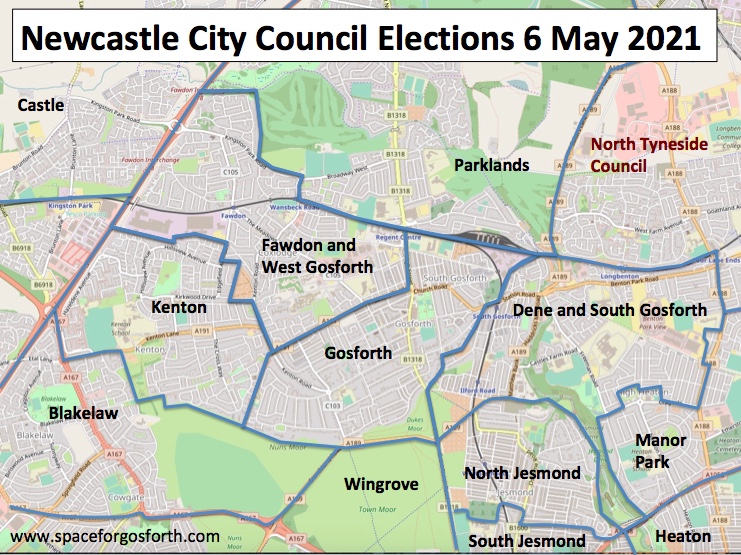
The delayed elections for Newcastle City Council and for the Northumbria Police and Crime Commissioner are due to be held on 6 May 2021. These were originally due to be held in 2020 but were postponed by the Government because of Covid-19.
This blog looks at what has happened since the last local elections in 2019, and what local candidates and political parties are offering now.
2021 Results – Post Election Update
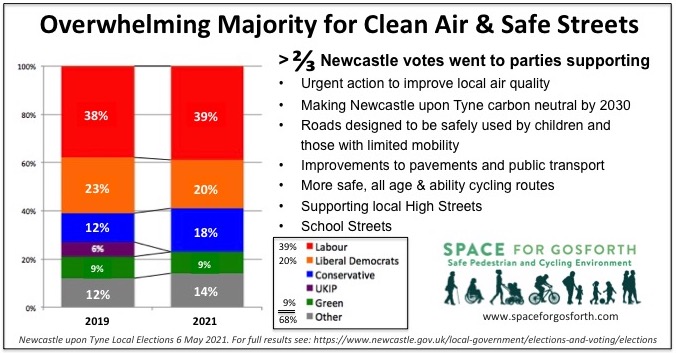
Five Pledges
In 2018 and 2019, we asked candidates in Gosforth wards to support five pledges linked to SPACE for Gosforth’s objectives, or if they didn’t support those pledges to tell us what they planned to do instead. Those pledges were:
- Streets that are safe (and feel safe) for children to walk and cycle to school, to the shops or to the park.
- Air pollution in Newcastle brought within legal limits as soon as possible.
- Residential streets that are pleasant, safe and attractive places to live and where children can play out.
- Rapid implementation of temporary changes to trial interventions to support these objectives.
- Constructive community engagement about how to address the public health impacts of travel and the benefits of active travel.
We also wrote a bit of background about why we chose these particular statements.
What’s happened since 2019?
In May 2019, Newcastle City Council consulted on how to achieve compliance with air quality limits, with a further consultation on its final Clean Air Zone plan in November 2019. You can read the SPACE for Gosforth response here.
While we have some doubts whether the plan by itself will be sufficient, it is a positive and necessary step towards achieving legal limits, and supports both pledge 2 (air quality) and pledge 5 (community engagement).
In April 2019, the Council declared a Climate Emergency, a motion proposed by the Liberal Democrat group. In November 2020, the Council was one of only four places in the UK to receive the top “A” grade from international climate research provider CDP and one of only 88 globally.
In September 2019, the Liberal Democrat group also proposed a motion for “Greater Focus on Cycling”. The final motion, amended by the Labour group, was approved in October 2019. This noted amongst other things that “Bicycles require less physical space than a car and given the number of people who travel in their car alone, cycling is a more efficient way of moving people within the limited space of a city” and that “In line with [the Council’s] Street Charter, our streets and roads should be designed to be safely used by children and those with limited mobility.”
In early 2020, Covid-19 started to spread, and in March 2020 the Government introduced a lock-down aimed at stopping the spread of the virus, leading to a dramatic reduction in vehicle traffic.
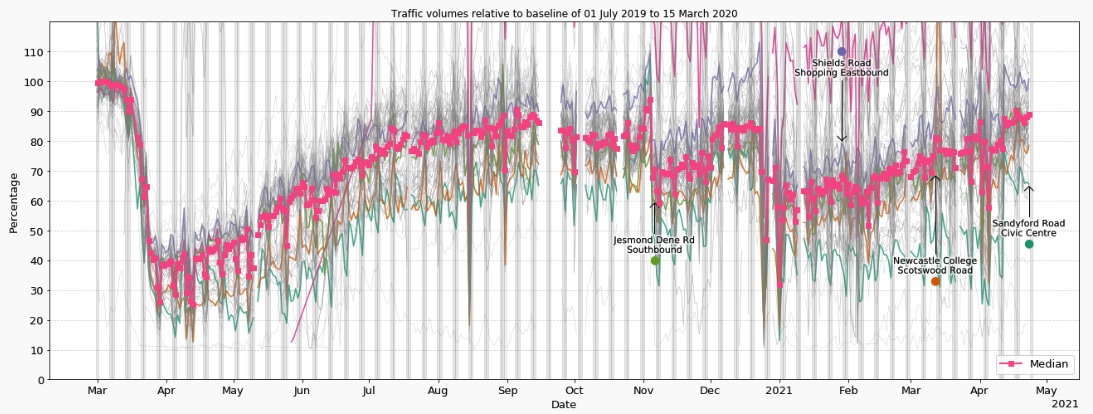
Traffic volumes in Newcastle since March 2020. Source: https://covid.view.urbanobservatory.ac.uk/#traffic-national
Over April traffic in Newcastle was running at about 40% of its normal level, which felt eerily quiet. This is what a child in the 1970s would have experienced when growing up – in 1974 traffic levels were about 40% of what they were in 2019. By May this had increased to 50% (~1983 traffic levels), by June it was 60% (~1987) and in July and August at about 80% (~1998).
Cities around the world also started to look at how we could continue to travel given four main factors:
- The need for social distancing to minimise the spread of the virus.
- A dramatic reduction in public transport capacity due to transmission risks, meaning we would need alternative ways to travel, especially for those without access to a car.
- Air pollution and its link to the spread of Covid-19 and underlying health issues meaning people affected are less likely to survive the virus.
- A crisis of inactivity also leading to underlying health conditions and making it harder for people to recover from the virus. Recent research suggests exercise can cut Covid-19 death risk by more than third.
In May 2020 the Conservative Government published statutory guidance for local authorities (effectively an instruction) saying that “Local authorities in areas with high levels of public transport use should take measures to reallocate road space to people walking and cycling, both to encourage active travel and to enable social distancing”, also publishing new design standards for cycle routes. Councils were instructed to implement these measures rapidly, with the Government saying “Pop-up bike lanes with protected space for cycling, wider pavements, safer junctions, and cycle and bus-only corridors will be created in England within weeks“.
Among the measures recommended by the government were:
- Installing cycle facilities with a minimum level of physical separation from volume traffic
- The introduction of ‘school streets’.
- Reducing speed limits.
- Modal filters (also known as filtered permeability); closing roads to motor traffic, for example by using planters or large barriers.
- Widened pavements to enable social distancing e.g. while wait for the bus or queuing for shops.
Effectively, the Government mandated our pledge 4: Rapid implementation of temporary changes to trial interventions.
Current Coronavirus (COVID-19): safer travel guidance for passengers still says (at 26/4/2021) “When you need to travel, walk or cycle if you can.”

In Newcastle the Labour-led Council implemented trials on the five bridges, Grey Street and on Queen Victoria Road next to the RVI, with funding now also confirmed to make changes permanent on Grey Street and Queen Victoria Road. The decision on the five bridges, which aligns with our pledges 1 (Streets that are safe (and feel safe) for children to walk and cycle) and 3 (Residential streets that are pleasant, safe and attractive places to live) will be made after the election.
On Gosforth High Street changes were made to enable social distancing based on the Government recommendations, and at Regent Centre to protect the existing cycle lanes to create a safe route to and from north of Gosforth.
Consultations on the bridges and on Gosforth High Street were held using the Commonplace website, and the Council has also invited residents to share ideas for low traffic neighbourhoods where they live, to add to feedback on walking and cycling routes from the Council’s consultation in early 2019.
In February the Council launched a 12-month trial of eScooters and is also proposing to launch trials of school streets over the summer term.
Just as important though is what hasn’t changed. In Newcastle we still have illegal levels of air pollution and, in a typical year, over 100 killed or seriously injured in road traffic collisions. The Chronicle has reported “Newcastle clean air tolls now set for ‘later in 2021‘”.
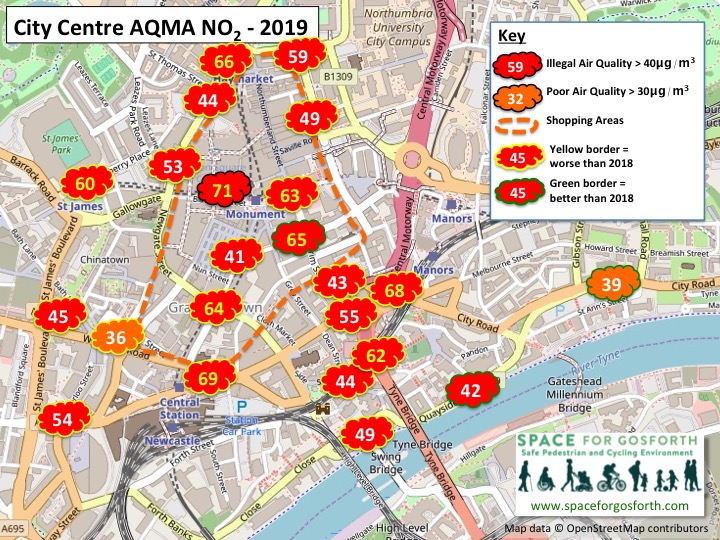
Air quality in Newcastle City Centre
What’s Next?
Labour, Liberal Democrats, Conservative and the Green Party are all standing candidates in all four Gosforth wards, so we’ve had a look at what they have said in their manifestos.

Candidates for the May 2021 local elections
Newcastle Labour have published their manifesto for 2021. Labour’s commitments on transport include saying they will:
- work with residents, businesses and public sector partners to decarbonise our economy and create a whole new generation of ‘green industry’ jobs;
- take decisive action to tackle poor air quality, including introducing a Clean Air Zone in areas most affected by poor air quality;
- pedestrianise more areas in the city centre, improve and extend bus priority lanes across the city and campaign for cheaper bus fares;
- introduce Play Streets / Low Traffic Neighbourhoods / School Street pilots;
- continue to lobby government for greater investment in public transport, including integrated smart ticketing, despite Government’s clawing back of funds to enable this work, and for local authorities to have more control over public transport provision in their area;
- seek funding to introduce more electric vehicle charging points across Newcastle, with the aim of having the most comprehensive charging network of any UK city;
Newcastle Liberal Democrats say in their manifesto they will
- make as a priority the need to invest in repairing our crumbling roads and pavements. We would re-prioritise existing Council resources to make a start and would look for external sources of funding.
- find new ways to ensure that local people’s views contribute to decisions and we will consult with residents about neighbourhood planning and devolving decision-making power to them.
- massively extend the city’s electric bus routes and we will make it easier to cycle across the city, with better and safer cycle routes.
The Liberal Democrats have also previously proposed a Workplace Parking Levy and called for the introduction of school streets.
Newcastle Conservatives haven’t release a manifesto but on the news section of their website the say they:
- Opposed the approach to make changes quickly with the public consultation running in parallel.
- Opposed the types of changes e.g. widening pavements and closing minor roads to through traffic.
- Proposed that the Council should offer free parking.
In doing so, Newcastle Conservatives appear to be in the strange position where they oppose their own Conservative Government’s statutory guidance that explicitly specified the types of changes to be made and the very quick timescales in which those changes had to be implemented.
Spending limited Council resources to encourage more people to drive into a congested and polluted city centre is also unlikely to support plans to reduce air pollution.
Newcastle Green Party say in their “Greenprint for Newcastle” that they want to “shift as many journeys to walking, cycling, or public transport as possible” and will encourage:
- The shift to higher levels of cycling and would enable this with segregated, protected cycling infrastructure that is suitable for all ages.
- The use of e-bikes (and e-cargo bikes) for those less able to pedal themselves.
- Subsidising public transport through a workplace parking levy.
- An electric shuttle service for those with mobility issues.
- Shifting the transport of goods to more sustainable methods.
- Invest in more, safe cycle storage across the city and encourage employers to provide more.
- Create Low Traffic Neighbourhoods (LTNs) and School Streets to encourage more parents and children to walk and cycle to and from school.
- Offer heavily subsidised bus passes for sixth-form, college and university students.
Newcycling has also asked the main political parties for their views on how they will support walking and cycling in their blog on 2021 Local Council Elections, and SPACE for Jesmond have asked candidates in North and South Jesmond wards how they would support walking and cycling.
Gosforth High Street
Local candidates in Gosforth Ward have given their views on the future for Gosforth High Street, our most important local destination as well as having some of the worst air pollution in Newcastle and a poor road safety record – both of which pre-date the recent social-distancing changes.
| Candidate | High Street proposals – from local candidate flyers |
| Philip Hall, Liberal Democrats |
“We need action to tackle air quality, the climate crisis, and the need to shift to active travel, with schemes the whole community can get behind. The High Street is a fantastic local asset, and Phil will champion efforts to make it thrive.” |
| Isra Mohammed, Labour | “A Safer More Inclusive High Street.” “I am keen to improve the physical and natural environment in all parts of Gosforth and listen to concerns of residents about the High Street.” |
| Anandavardhan Anand, Conservative | “I will unleash the potential of Gosforth High Street by transforming it into the social and economical hub that it needs to be. In order to do this, I will work to deliver common sense road layouts… better parking facilities, stronger support for local businesses and pothole repairs.” |
| James Sheerin, Independent | “We need to find a way of reducing the volume of traffic as well as the emissions of vehicles using it. At the same time we need to increase ease of access to the High Street in innovative ways, such as electric shuttle buses and taxi services linking the places people live to the shops, restaurants and pubs on the High Street.” |
Improving walking and cycling access to and along Gosforth High Street will be key to helping the High Street thrive in future, while also addressing longstanding air quality and road safety concerns.
Note that the Green Party is not included in the table above as they did not distribute flyers in Gosforth Ward. Also, reference the comment about potholes, Gosforth High Street was resurfaced in January 2019.
Police and Crime Commissioner Elections
The Chronicle has written an article Meet the four candidates standing in Northumbria Police and Crime Commissioner election in May, in which each of the candidates set out their priorities.
We have also asked PCC candidates via Twitter if they will support Action Vision Zero’s priorities for how to keep us safe when travelling in our local communities.
Hi @KiMcGuinness, Action Vision Zero @ActionVZ have come up with five priorities for how the Police can keep us all safe when travelling in our local communities.
If you are re-elected as #NorthumbriaPCC, will you support and commit to these priorities? https://t.co/4tohaVhz17
— space for gosforth (@space4gosforth) April 24, 2021
Chronicle Live – Police and Crime Comissioner hustings
At 1 hour 5 minutes, you can hear the candidates answer our question – “do candidates will support a target of zero killed or seriously injured on roads and how will they achieve this?”
How to Vote?
Information on how to vote is available on the Newcastle City Council website as well as candidate details and past results.
Party and Candidate Websites
- Liberal Democrats https://newcastle-libdems.org.uk/en/
- Labour https://www.newcastlelabour.org.uk
- Conservative https://www.newcastle-conservatives.co.uk
- Green Party https://newcastleupontyne.greenparty.org.uk/
- James Sheerin, Independent, Gosforth Ward https://www.ne3.eu
- John Hall, Newcastle Independents, Parklands Ward https://www.newcastlefirst.uk/wards/parklands/.

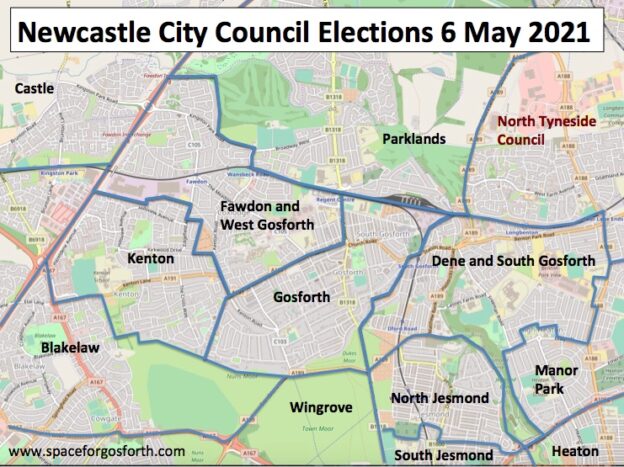
Current plastic barriers causing more pollution as the traffic is at a standstill and single file
Buses that don’t drop off or pick up on the high street should be re routed
Ideally all buses should drop off at the nearest metro station for onward journey as many cities do
I drive to the high street and the parking facilities are abysmal and strewn with litter – how can businesses thrive is you cannot get there
The condition of the park is atrocious- broken glass litter everywhere – who is liable for any accidents this might cause – police patrols during the day to watch over pensioners and mothers with prams – but none at night ! When there is evidence of illegal drinking and fires
That’s interesting Stewart. We’ve looked at the air pollution and it appears to be no worse than before. We published some results here: https://www.spaceforgosforth.com/safe-gosforth-high-street/
Could you share which figures you are looking at please so we can compare?
Please do report any issues you find with the park to Urban Green. This is their contact page: https://urbangreennewcastle.org/contact